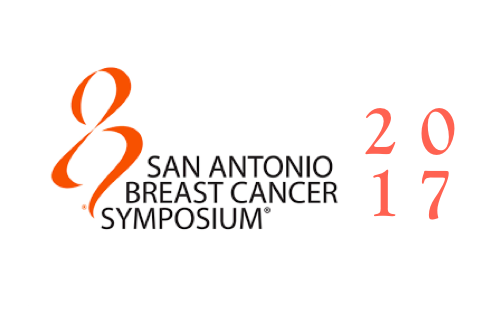THE CUTTING EDGE
EVIDENCE BASED INFORMATION
CONSTANTINE KANIKLIDIS
DIRECTOR, MEDICAL RESEARCH
SABCS 2017 RESEARCH UPDATE
WHAT YOU NEED TO KNOW, NOW

BREAKING NEWS FROM SAN ANTONIO: WHAT YOU NEED TO KNOW
Constantine Kaniklidis
December 25, 2017
SABCS 2017 RESEARCH ROUNDUP
The Winter holidays - rather quietly - brought some extraordinary holiday Cheer and Hope in the way of powerful frontier-edge advances in the treatment of all forms of breast cancer, for ER+ disease, and for HER2+ disease, and for TNBC, and for BRCA-positive breast cancers. Below I give my choices of the best of these, with some critical - and optimistic - commentary of my own.
Breakthroughs in Endocrine Therapy
I have already written about the breakthrough results in endocrine therapy (for ER+ disease) stemming from the FDA approval of the selective CDK4/6 abemaciclib (Verzenio): exceptional survival outcomes even in later stage metastatic disease in heavily pretreated patients, outcomes higher than any other agent used in breast cancer to date; high rates of response; durable survival benefits; its combination possibilities with aromatase inhibitors and fulvestrant and PD-1/PD-L1 checkpoint inhibitors among others. Al this following the impressive efficacy of two other FDA-approved CDK4/6 inhibitors, palbociclib (Ibrance) and ribociclib (Kisqali).
SABCS 2017 now brings us further promising benefits of combining abemaciclib (Verzenio) with the checkpoint inhibitor pembrolizumab (Keytruda), where the JPCE trial found benefit in pretreated ER+ disease without adding any additional toxicity. In addition, the phase II neoMONARCH trial found neoadjuvant abemaciclib (Verzenio) plus anastrozole active in early breast cancer, dropping the rate of proliferation (Ki-67) to below 2.7%.
In addition, the MONALEESA-7 trial showed that ribociclib (Kisqali) improves PFS by 10.8 Months in ER+ pre- and peri-menopausal patients with advanced breast cancer: the median PFS was 23.8 months for women who received ribociclib (Kisqali) combined with either tamoxifen or a nonsteroidal aromatase inhibitor (AI) plus goserelin (Zoladex), compared with 13.0 months for those who received standard endocrine therapy, highly significant results for the challenging group of younger-aged breast cancer patients.
Breakthroughs in HER2 Therapy
We also saw some significant advances in HER2-positive disease. ThePhase IB/II PANACEA trial found that the combination of the checkpoint inhibitor pembrolizumab (Keytruda) plus trastuzumab (Herceptin) can achieve an impressive disease control rate (24%) in trastuzumab-resistant, PD-L1–positive, HER2+ breast cancer patients, potentially adding another weapon in our arsenal of effective anti-HER2 therapies.
In addition a new formulation of trastuzumab (Herceptin), namely trastuzumab deruxtecan which is a highly potent antibody conjugate (like T-DM1 (Kadcyla)) was highly active in heavily pretreated patients HER2+ metastatic breast cancer patients, with a exceptional durable overall response rate (ORR) of 61.4%, extremely impressive given that this was in patients who had already moved through some of the most potent HER2-targeted therapies including trastuzumab (Herceptin) itself, and T-DM1 (Kadcyla), and pertuzumab (Perjeta), and also impressive was a disease control rate (which includes stable disease) of between 84.2% up to 100%!
With an FDA Breakthrough Therapy Designation, I expect to see regulatory approval quickly, adding an exceptional exciting and powerful new agent to anti-HER2 therapies for advanced disease.
Breakthroughs in TNBC Therapy
In the challenging TNBC arena, SABCS 2017 brought us what I consider to be four breakthrough advances.
Antibody-Drug Conjugate Active in Heavily Pretreated Metastatic TNBC
One phase 1 study of TNBC patients who were already heavily pretreated found that monotherapy with an antibody drug conjugate (ADC) biological agent, ladiratuzumab vedotin (SGN-LIV1A), showed encouraging antitumor activity in a with heavily pretreated TNBC, with a 58.3% disease control rate (including stable disease). This brings a targeted biological agent into the TNBC therapeutic context, rather than just chemotherapies.
In addition, the ENHANCE1/KEYNOTE-150 Phase IB/II trial found the checkpoint inhibitor pembrolizumab (Keytruda) combined with eribulin (Halaven) delivered impressive efficacy in patients with metastatic TNBC, with disease control rate of 36.8% in this highly challenging population.
Sacituzumab Govitecan Highly Effective in Heavily Pretreated mTNBC
Still another immunotherapeutic agent, sacituzumab govitecan / IMMU-132 (another antibody-drug conjugate (ADC) achieved an objective response rate (ORR) of 34% in patients with heavily pretreated metastatic TNBC, and better survival outcomes than available conventional chemotherapies in this context.
Finally, the CALGB 40502/NCCTG N063H trial found that third-generation taxane, nab-paclitaxel (Abraxane) - one of my favorite drugs for metastatic breast cancer - shows promising improvements in both overall survival (OS) and progression-free survival (PFS) compared to standard paclitaxel (Taxol) for patients with metastatic TNBC, with a 26% reduction in the risk of death.
Breakthroughs in BRCA+ Therapy
Two advances in PARP inhibitors continue to expand our regimen stockpile against BRCA-mutated breast cancer: the Phase III EMBRACA Trial found that PARP inhibitor talazoparib improved PFS in BRCA-positive patients, impressively reducing the risk of disease progression or death by 46% versus chemotherapy. And the MEDIOLA Trial showed that a unique combination of the PARP inhibitor olaparib (Lynparza) plus the immunotherapeutic checkpoint inhibitor durvalumab (Imfinzi) elicits a disease control rate of 80% (!) for pretreated patients with germline BRCA-mutated, HER2-negative metastatic disease. These are truly breakthrough findings in the treatment of BRCA+ metastatic disease.
A DEBT OF GRATITUDE
My thanks to the No Surrender Breast Cancer Foundation that Gina Maisano made possible, a gift that keeps on giving, having helped to:
(1) save many souls
(2) prolong many lives
(3) bring Hope where there was Hopelessness
(4) provide an extraordinary community of Caring and Giving and Support, and
(5) immeasurably advance the field of patient-centric breast cancer Knowledge and Guidance.
WE ARE ALL FOREVER IN HER DEBT.
BEST OF THE HOLIDAYS TO ALL!!!
HEALTH | HOPE | HAPPINESS
Constantine Kaniklidis
Director, Medical Research, No Surrender Breast Cancer Foundation (NSBCF)
Oncology Reviewer, Current Oncology [journal]
Society for Integrative Oncology (SIO)
Member, European Association for Cancer Research (EACR)
The No Surrender Breast Cancer Foundation is a 501 c 3 Not-For-Profit Organization. Please see our Disclaimer and Terms of Use.
